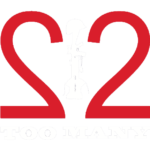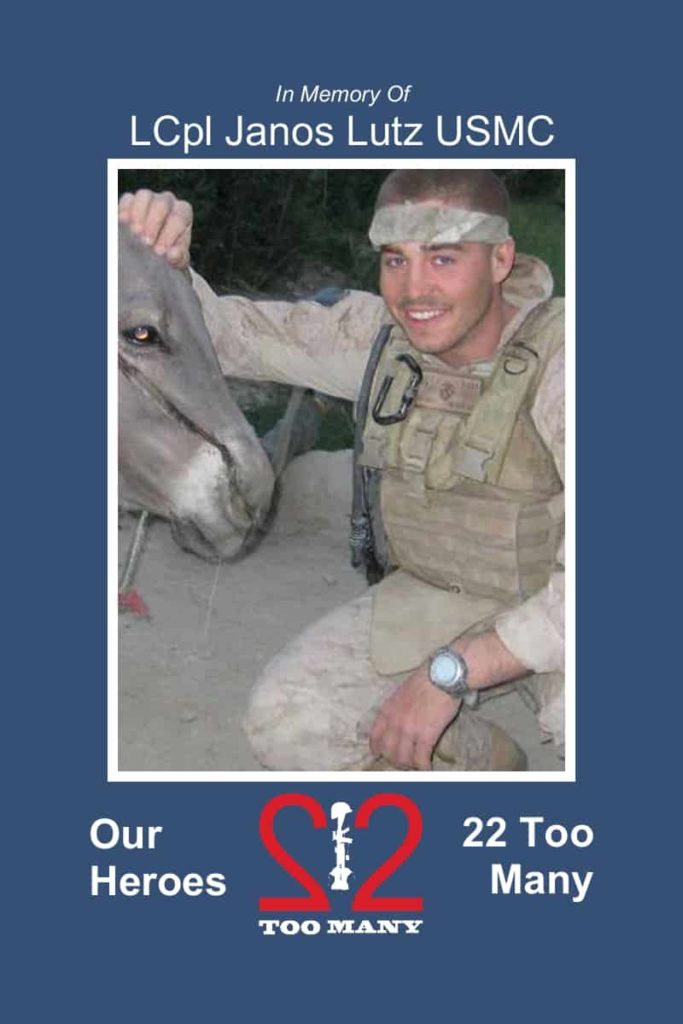LCpl Janos V Lutz, USMC
May 27, 1988 – January 12, 2013
It was 5:00 am October 31, 2006 while most teenagers were sleeping soundly in their beds dreaming about the Halloween parties occurring later that day, my 18 year old son Janos Lutz (John) was being transported to Parris Island where he would begin his transformation into the US military. Fast forward to almost a year later, April 2007 John found himself graduating into a U.S. Marine. I sat proudly in the crowd with tears of joy in my eyes, as I watched my son so full of life and determination standing to accept his new role in life. I stood with him accepting that I too had a new role in life, as a proud Marine Mom. Laughter, tears, and lots of hugs followed after the ceremony as John received his station orders.
Next stop Camp Lejeune, NC. John continued his training to become a Marine Assaultman. He worked tirelessly for 1 year with his brothers and became an expert in the application of violence. A well trained and oiled machine, my son was ready for his first assignment. He deployed to Ramadi, Iraq exactly 1 year to the day he left his quiet home in Davie, FL. Like most Marine deployments it was 6 months. Despite the harsh conditions and perils of war John made it home unharmed and still had that same fire in his eyes and smile on his face as when he first became a Marine. Reunited with John, it was as if he never left and I had my son back strong and still determined to serve his new role in life to the fullest.
John’s reunion was short lived as he received his next deployment in the “Summer of Decision” 2009. This time he would journey to Afghanistan to faithfully serve his country once more. John was about to be part of the biggest helicopter drop of U.S. service men since the Vietnam War. He accompanied 4,000 of his fellow Marines into the uncharted territories they would soon come to know as hell on earth. 2nd Battalion, 8th Marines (2/8) would engage in Operation Khanjar, which means Operation Strike of the Sword, and 2/8 was at the tip of the sword.
The battle began July 2, 2009 and it provided its first casualty not shortly thereafter. Perhaps, this was an omen as to the loss our Marines would experience in the years following. During the next 6 months our Marines endured grueling temperatures of over 142F, food shortages, lack of water and low ammunition. Improvised Explosive Devices (IEDs) riddled the land preventing supply caravans from reaching them. As a result many Marines lost an average of 40 lbs that summer. Sick, dehydrated, and vomiting uncontrollably our Marines fought on for us, for our country, and to stay alive long enough to return to the arms of those they loved. “I am my brother’s keeper” they repeated over and over again in their head as they fought beside their brothers, the only thing that was keeping them alive. For those of us home safe in America, we know now that this in fact was the only thing that kept them going thousands of miles away completely disconnected from the familiar life they once knew. Bonding with their brothers over a common goal of survival by each pledging to give his life to save their brothers,
2/8 lost 14 men that summer. Those who survived suffered the causalities of lost limbs, lost brothers, and many endured life changing injuries.
From the sidelines, us at home saw our returning Marines and thought what a blessing it is that they made it back alive. Joy and happiness flowed through us as we cried out tears, but their tears were that of pain and loss. Those Marines who made it back simply traded one battlefield for another. As they retired their guns and stepped off that plane, they were completely unprepared and unarmed to fight the battle that would soon follow. This battle takes more of our Veterans lives here at home, than any offshore battlefield. Post-Traumatic Stress robs the life from 22+ veterans a day on home soil.
Post-Traumatic Stress is labeled as a Disorder (PTSD), yet it is a natural reaction to the traumatic sights, painful experiences, and unspeakable loss our service men and women return with from war. Programmed for battle, they are turned on and released out in unfamiliar territory where they are pumped with adrenaline 24/7 and constantly on alert. Every moment they must face the fact that it could be their last, with an enemy around every corner their only protection is their fire arm and their brothers. The United States Marines train our combat veterans for 1 year to become experts in the application of violence but they failed to untrain them so they could reintegrate back into society. John, along with all his brothers took a mandatory 40 hour reintegration course upon returning home. 40 hours was given to undo a year of training and months/years of shear hell on the battle field. We call the side effects from this uneven balance PTSD, but in reality it is a struggle to find a way for our veterans to cope.
John was given between 17-24 prescriptions at one time after being diagnosed with PTSD by the Veterans Administration. The side effects from the drugs alone were dangerous and when combined they included a mix of hallucinations, paranoia, rapid heartbeat, suicide and much more. In June 2010, while John was still at Camp Lejeune, the VA prescribed him Klonopin which is an anti-anxiety drug along with his current medications. One of the side effects of Klonopin is suicide. One week after taking the additional prescription, John, my son, made his first suicide attempt. He was found just at the moment when he stopped breathing. Despite being near death as a result of doctor prescribed medication, the VA continued treatment of my son.
Fast forward to January 2013 John was in a deep depression state despite attending his weekly appointments at the local VA. He met with his psychiatrist, they talked, and in full confidence John revealed to her that I had his morphine under lock and key and that he only took it as needed. I was working with John and slowly taking him off medication which was working to stabilize his depression. Despite their knowledge of me locking up his meds, his psychiatrist prescribed him Klonopin, the same drug that lead him down the path of suicide just 2 years earlier. After leaving her office, John went to see his orthopedic doctor in the same building, for treatment of his cracked back (A casualty he experienced from his time in Afghanistan). This doctor’s solution was also to put 90 morphine in my sons hand with a severe PTSD diagnosis. After visiting a psychiatrist and a doctor at the local VA, John returned home with 2 filled prescriptions and 8 days later, I found myself without my son and my new role in life became a grieving Marine Mom.
Since the loss of my son I have delved into his medical records and discovered a plethora of medications that was given to my son predating his return home. In addition to the Klonopin he was also given Mefloquine, referred to as “the governments Suicide Pill”. As it turns out many of our service men and women in Iraq and Afghanistan were given Mefloquine which is an anti- Malaria drug whose side effects include vivid dreams, hallucinations, paranoia and suicidal ideations.
What I have learned from the multitude of losses as a result of PTSD Suicide is that reintegration takes time, support and battle buddies sticking together. Instead of exhausting government money on Psychotropic Drugs for a bandage to mask the problem, we need to invest in proper reintegration programs for our service men and women immediately following their reentry on American soil. “We the People” have to rally together and “Fight for Those Who Fought For Us.” Armed with this information we must demand a call to change for the way the VA prescribes medicines to our returning veterans. Our returning service men and woman deserve intense, lengthy, and empathetic Reintegration Counseling and Therapy. It has become my mission to tell the world about Post Traumatic Stress and to get our Veterans to talk about it. PTSD has always been a dirty little secret and this must stop now! Our Veterans Post Traumatic Stress is being compounded by the effects of psychotropic drugs and, “We the People” must stand up for them. This is why I started the LCpl Janos V Lutz Living to Tell Foundation. “We the People must “Fight for Those Who Fought for Us.” Mama Lutz

